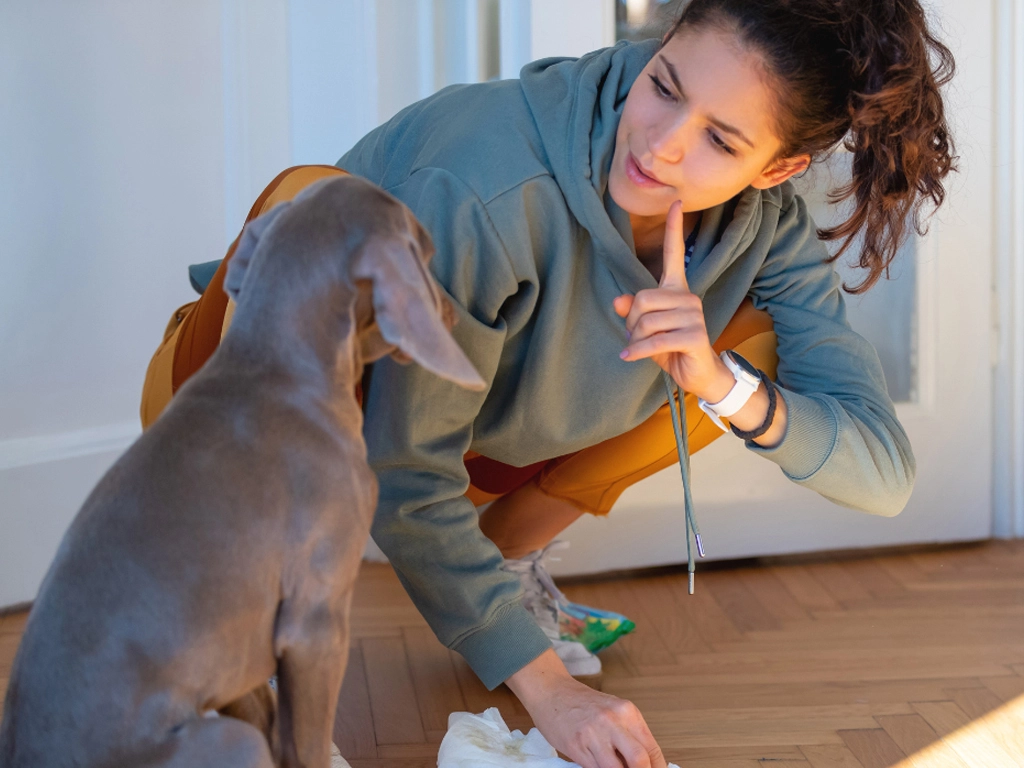House Breaking: A Step-by-Step Guide for Pet Owners
Welcoming a new puppy or adult dog into your home is akin to starting an exciting yet challenging chapter in your life. Among the first and most crucial tasks is housebreaking – a fundamental aspect of pet ownership. This guide will be more focused on puppies but all the same principles apply to housebreaking an older dog as well.
Understanding Puppy Behaviour

Puppies, much like young children, are in a constant state of learning and discovery. Their behaviour is driven by curiosity and a natural instinct to explore their environment. Understanding this is crucial in housebreaking. It’s about reading their signals – when they start sniffing or circling, it’s often a sign they need to go. Once you get further along in the process, the cue may be going to the door they always go out to go to the washroom. Recognising these cues early on is like cracking a code, making communication between you and your puppy more effective.
Setting Up for Success
Embarking on the journey of puppy housebreaking is akin to preparing for a marathon – success hinges on thorough preparation and setting the right environment. This stage is crucial in laying the groundwork for a smooth and effective training process.
Here’s how to set up for success:
The Leash
Having your puppy on a leash right from day 1 will make this process of going to the washroom much easier. They will not be able to go off and play with the butterfly or engage with other dogs or humans and be kept on task. Puppy’s attention span can be very short so if they have the option to go do something else, they will.
Choosing the Right Spot for Toileting
Selecting an appropriate toileting area is a pivotal decision in house breaking. Choose a quiet corner of your yard that’s not used for other activities. The key is consistency – always guide your puppy to the same spot. This consistency helps build a strong association between the location and the act of toileting, much like we associate a dining room with eating.
Using Confinement and Supervision
Confinement, when used correctly, can be a powerful tool in housebreaking. This doesn’t mean keeping your puppy in a small crate all day, but rather using a crate to help them learn to control their bladder and bowels when you can not supervise them. The space should be comfortable and just large enough for them to stand, turn around, and lie down. It’s a bit like a cozy den where they can feel secure and relaxed.
Supervision is equally important. When your puppy is not in their confined space, keep a close eye on them. This vigilance allows you to pick up on cues that they need to go and helps prevent accidents around the house. It’s about being proactive rather than reactive. Repetition is key in dog training and if they keep doing the wrong thing, they will not learn what you want.
Establishing a Feeding Schedule

A consistent feeding schedule plays a significant role in successful housebreaking. Feeding your puppy around the same times each day helps regulate their digestive system, making it easier to predict when they’ll need to go outside. This regularity is like setting an internal clock for their toileting needs.
Preparing for the First Few Nights
The first few nights with your new puppy can be challenging. Puppies often need to go to the toilet during the night, so be prepared for some disrupted sleep. You might consider keeping their crate in your bedroom or nearby, so you can hear them if they become restless. It’s a bit like having a baby monitor – it helps you respond quickly if they need to go out. The key component of this is SILENCE. Do not talk to them or make a big deal about them going. Just get up, bring them outside with a leash on, let them go to the washroom and then bring them back in and put them in the crate with no communication. This is not a play session; it is a midnight potty. If you create a big deal of it, the puppy will learn they can get you up even when they do not need to go.
Positive Reinforcement: The Key to Success

Positive reinforcement in puppy training is like watering a plant – it encourages growth and development. This involves rewarding your puppy for good behaviour, such as toileting in the right place. Rewards can be in the form of treats, praise, or playtime. This positive association makes them more likely to repeat the desired behaviour.
They Just Will Not Go Outside
If you take your puppy outside and they do not go to the washroom (5 minutes is a very fair timeframe to use), bring them back into the house and put them in their crate. 15 – 30 minutes later, take them back outside again and repeat the process until they go to the washroom. Once they finally do go, throw a party, and bring them inside to play.
Dealing with Accidents
Accidents during the housebreaking process are inevitable. They should be treated as learning opportunities rather than setbacks. It’s important not to scold or punish your puppy, as this can lead to fear, confusion and them going to hide behind furniture to do their business when in the house. Instead, clean up any mess, and reflect on how to enhance your observational skills to better anticipate and prevent future accidents. If you catch them in the act, just scoop them up and take them outside to their spot to finish. It’s about guiding them towards the right path. Once again, this is on the person supervising the puppy, they missed their cues or were not watching the puppy closely so if you want to punish someone, punish that person for not doing a good job with the observation or keeping a mental clock of how long it has been since the puppy was last allowed to go outside. This approach not only aids in effective training but also fosters a trusting and positive relationship between you and your puppy.
Establishing a Consistent Routine
Consistency in puppy housebreaking is as crucial as following a recipe to the letter. A well-structured routine for your puppy is like a map that guides them through their day. It includes regular feeding times, play sessions, and potty breaks. This routine not only aids in housebreaking but also provides a sense of security and predictability for your puppy helping them to understand what is expected by understanding the rhythm of household life and their role within it.
The Importance of Patience
Patience in puppy training cannot be overstated. It’s about understanding that each puppy is unique and learns at their own pace. This journey requires time, understanding, and a lot of patience. Celebrate the small victories and understand that setbacks are part of the learning process.
Recognizing Progress and Milestones
Recognizing and celebrating progress in housebreaking is crucial for both you and your puppy. It’s about acknowledging the small steps and milestones achieved along the way. This could be a day without accidents or successfully signalling when they need to go out. Each of these achievements is a step closer to your ultimate goal.
When to Seek Professional Help
If you find yourself struggling with the housebreaking process, consult your veterinarian to ensure there are no medical issues with your pup and then contact K9 Principles and we can provide you with tailored advice and strategies. K9 Principles can offer insights and techniques that you may not have considered, helping you overcome any hurdles more efficiently.
Common Mistakes to Avoid
Navigating the path of puppy housebreaking is fraught with potential pitfalls. Being aware of these common mistakes can significantly enhance the training process, making it more efficient and less stressful for both you and your puppy. Let’s delve into some of these common errors and how to steer clear of them:
Inconsistency in Routine
One of the most common mistakes in puppy housebreaking is a lack of consistency. Just like children, puppies thrive on routine. Inconsistent feeding times, irregular opportunities for toileting, and erratic sleeping schedules can confuse your puppy, making it harder for them to understand what is expected of them. It’s akin to trying to learn a dance without a set rhythm – both confusing and frustrating. Establish and stick to a regular routine for feeding, toileting, and playtime to set a clear pattern for your puppy.
Negative Reinforcement
Negative reinforcement, such as scolding or punishing your puppy for accidents, is counterproductive. It can lead to fear, anxiety, and even distrust, which can hinder the learning process. Imagine trying to learn a new language while being reprimanded for every mistake – it’s not only daunting but also discouraging. Instead, focus on positive reinforcement. Praise and reward your puppy for good behaviour, which will encourage them to repeat those actions.
Overlooking the Importance of Supervision
Failing to supervise your puppy adequately is another common error. Unsupervised puppies are more likely to have accidents around the house or develop undesirable habits. Think of it as leaving a toddler unattended with a box of crayons and a white wall – the outcome is predictable. Keep a watchful eye on your puppy, especially during the early stages of housebreaking.
Delaying the Start of Training
Starting housebreaking too late can set the stage for a challenging training process. Puppies are most receptive to learning between the ages of 8 to 12 weeks. Delaying training beyond this window can be likened to missing the start of a marathon – you’ll be playing catch-up. Begin housebreaking as soon as your puppy comes home.
Using Inappropriate Cleaning Methods
Not cleaning accidents properly or using the wrong cleaning products can inadvertently encourage repeat markings. Puppies have a keen sense of smell, and if the scent of urine remains, they are likely to use the same spot again. It’s similar to leaving breadcrumbs on a trail – they’ll lead you back to the same place. Use an enzymatic cleaner specifically designed to neutralize pet odours.
Expecting Too Much Too Soon
Setting unrealistic expectations is a common trap. Puppies, like humans, learn at their own pace. Expecting too much too soon can lead to frustration on both ends. It’s like expecting a child to run before they can walk. Be patient, and celebrate the small milestones.
Overlooking Health Issues
Sometimes, frequent accidents can be a sign of underlying health issues, such as urinary tract infections or dietary problems. Ignoring these signs and attributing them solely to training issues can be detrimental. Regular veterinary check-ups are essential. It’s like ignoring the warning lights on your car’s dashboard – addressing potential problems early can prevent bigger issues down the line.
FAQs
-
A1. Puppies usually show signs like sniffing, circling, or becoming restless when they need to go. Observing your puppy closely will help you recognize these cues.
Conclusion
Housebreaking a puppy is a journey that requires patience, consistency, and understanding. It’s about building a bond with your new companion and guiding them through the early stages of their life. With the right approach and mindset, housebreaking can be a rewarding and successful experience. Remember, every puppy is unique, and what works for one may not work for another. Embrace the journey, stay positive, and enjoy the process of growing with your puppy.






